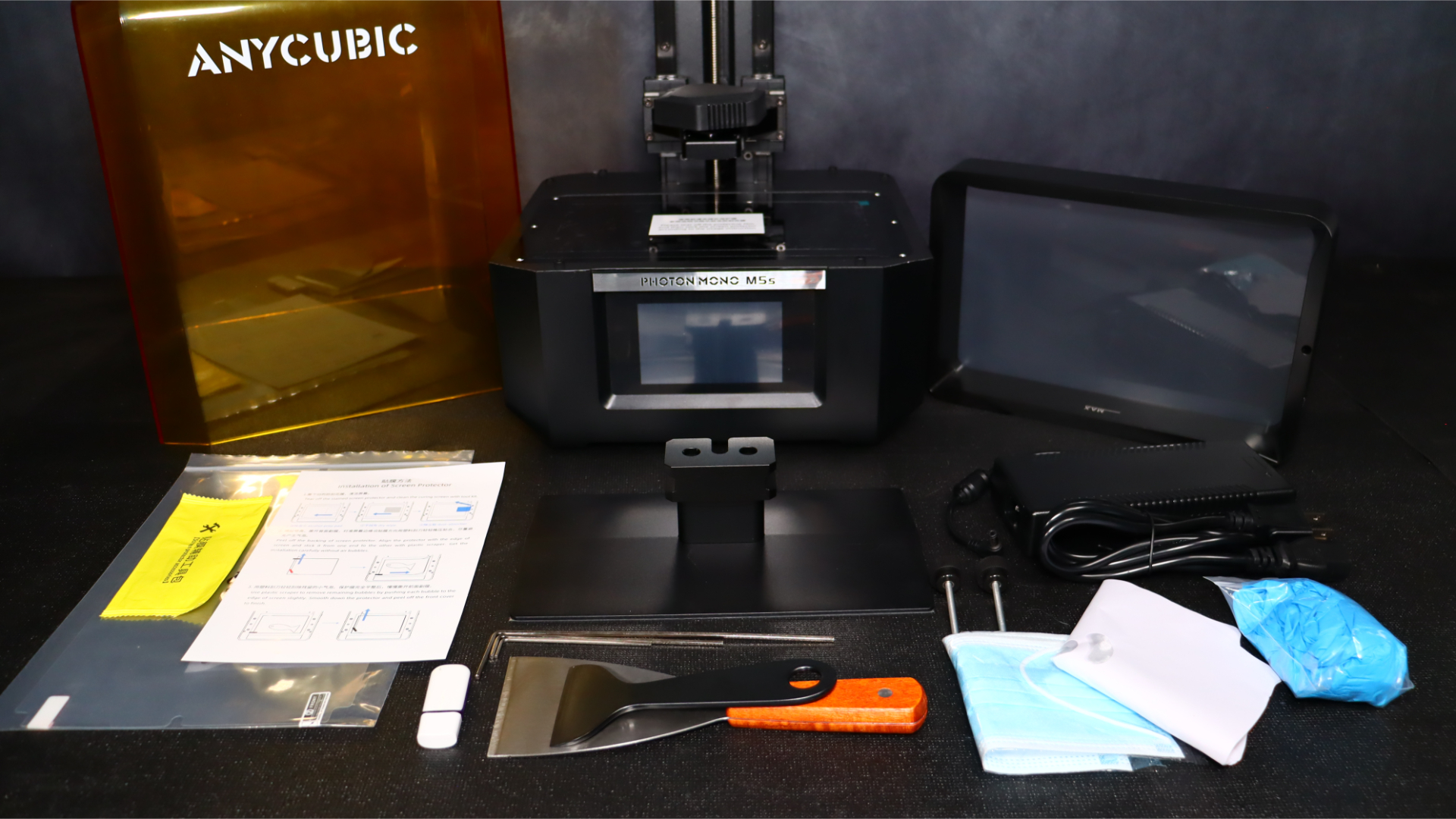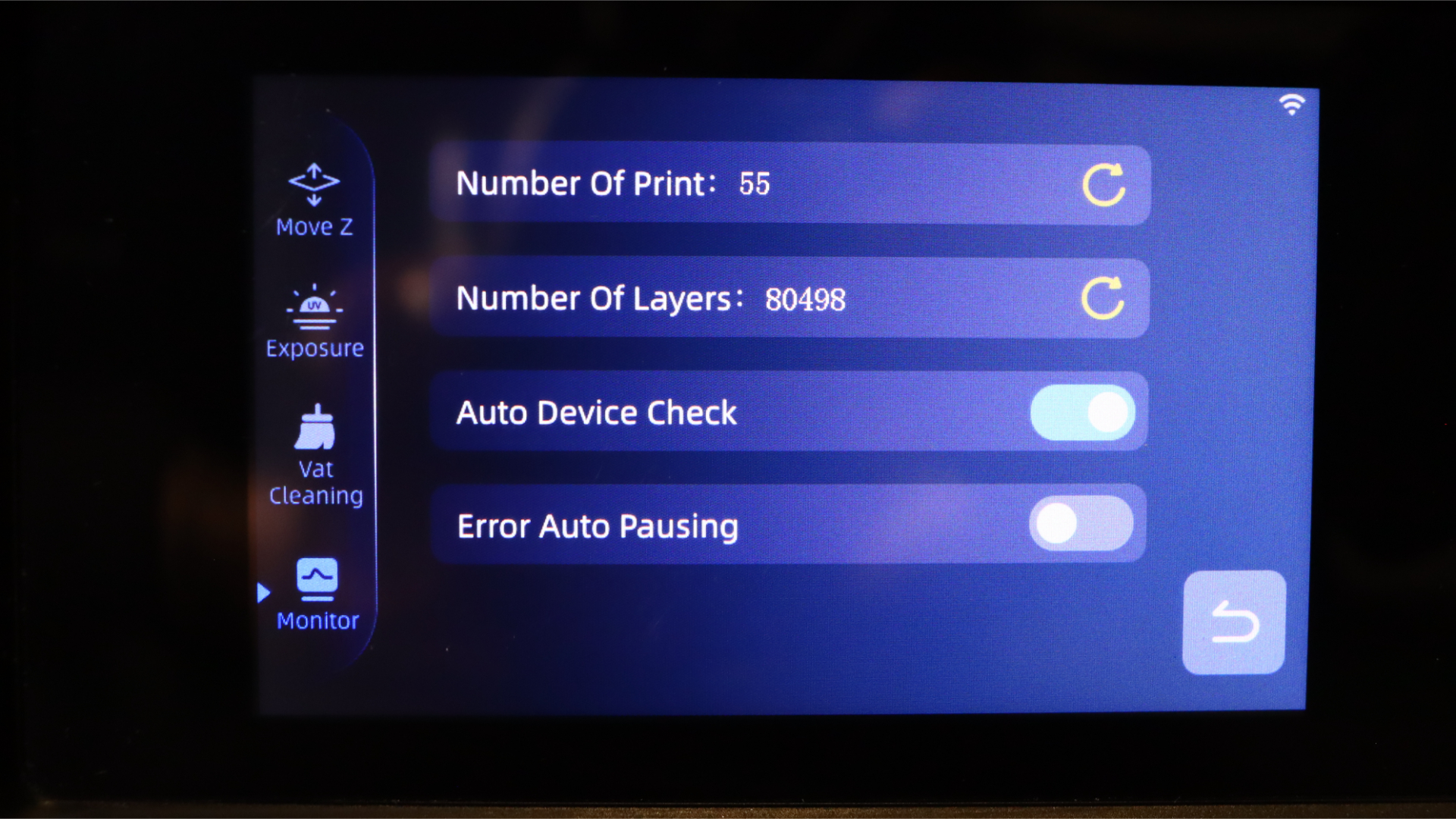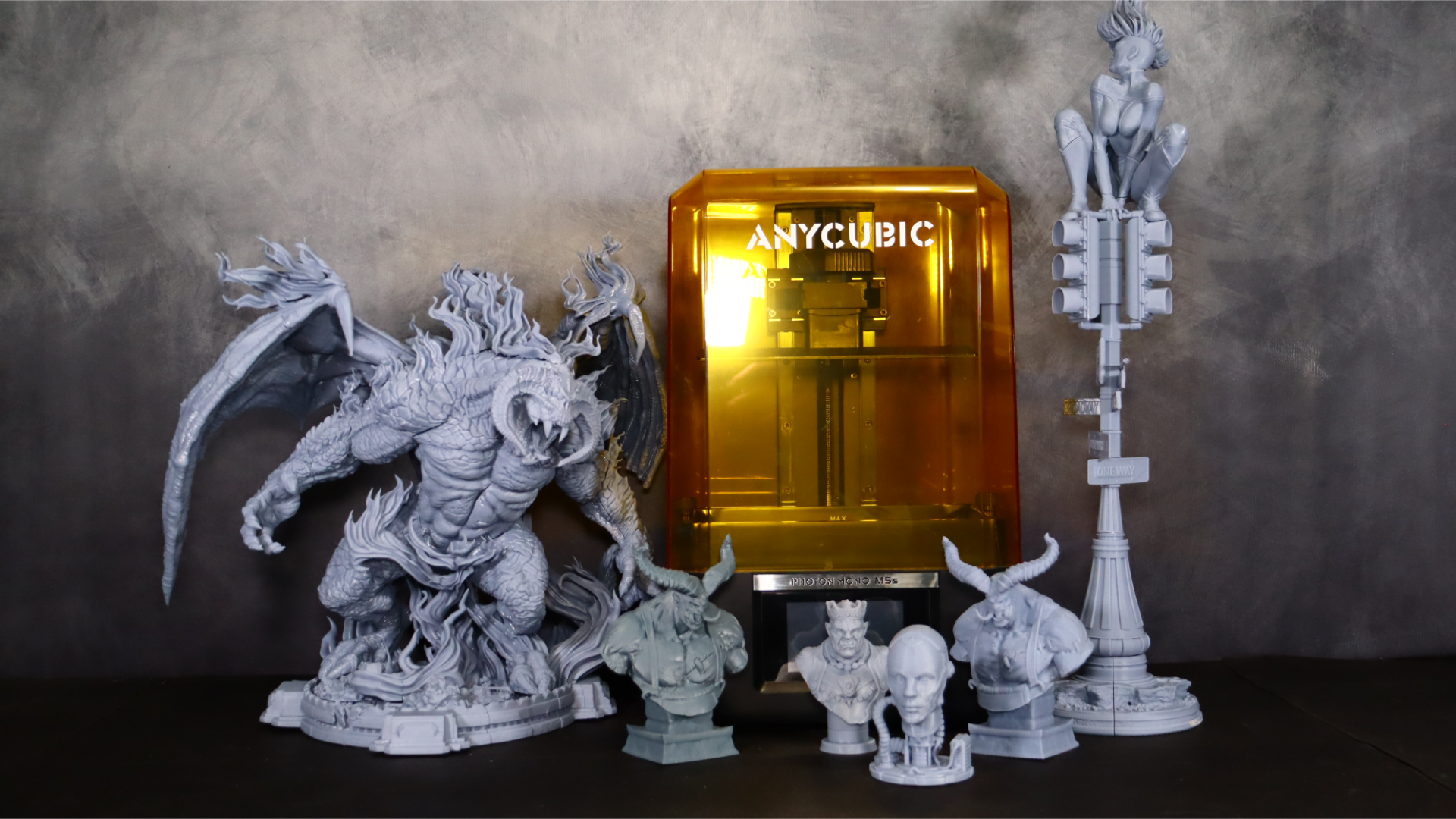The Photon Mono M5s, the latest addition to the remarkable lineup of Anycubic Photon resin printers, represents a significant leap in technology for consumer 3D printers.
With an impressive 10.1-inch mono screen and an astounding 12K resolution (11520 × 5120 pixels), this printer is looking to set a new standard for print quality. Alongside this, it has also has Anycubic’s impressive “Levelling Free” system, which offers true auto-levelling. You don’t need to do anything in theory, it will just check and level itself on the fly (and based on our testing, it works!).
Alongside these strides forward in tech, the Photon M5s also retains a lot of the features that people love about the Photon lineup. It has the same visual style, the same user-friendly touch screen interface and easy setup process.
When it comes to desktop resin printers, the Photon Mono M5s boldly establishes itself as a true game-changer. It’s ideal for both novices and professionals alike, letting users bring their creative visions to life with an unmatched level of detail and precision. We can comfortably say that this is one of the best 3D printers on the market right now.
Anycubic Photon M5s: Setup & design

The new Photon Mono M5s is the easiest Anycubic printer yet when it comes to setup. Simply follow a few steps to get started. First, remove the protective covers on the LCD screen, resin vat, and build platform. Then, install the included screen protector by cleaning the screen, removing any dust with the provided cleaning package, and aligning the protector to the holes on the printer base. Gently use a card or the plastic scraper to push out any bubbles, being careful not to apply too much pressure and damage the screen.
Once the protector is installed, attach the bed to the platform carrier and secure the resin vat with the two included knob screws. That’s it for the setup process! The leveling is handled automatically by a sensor on the platform carrier, and the Photon Mono M5s also features a self-check system that verifies the screen, leveling, and resin volume to ensure there’s enough material for the current print.
Additionally, the Photon Mono M5s includes smart printer status detection, which can identify print failures such as the print bottoming out on the screen and alert you accordingly.
The Photon Mono M5s maintains the classic Anycubic design, featuring a sleek black base and a vibrant yellow UV cover. The power supply plugs into the back, and there is a USB port on the side for file transfer.
The most prominent feature on the front is the 4.3-inch touchscreen, which is used to navigate menus, alter settings, and control the device during prints. The screen looks great, menus are clear and legible, and the touch screen is responsive.
Anycubic Photon M5s: Specifications & features
The Anycubic Photon Mono M5s was first-ever 12K printer to the market (though it has since been joined by the Elegoo Saturn 3 Ultra 12K). Boasting an astonishing 19-micron resolution, it stands among the sharpest and most precise printers available today.
Equipped with a state-of-the-art auto-level system, as well as an innovative auto device check, the printer undergoes a thorough self-check to ensure that every component is in optimal working order and ready for flawless printing. We found this system worked flawlessly during our testing, and it’s a real game changer, especially for novice users. Higher resolution screens are nice, but it’s features like this that will help bring 3D printing to a more mainstream audience.
The Photon Mono M5s features a third-generation release film that surpasses its predecessors in durability. Extensive testing confirms its exceptional longevity, withstanding over 30,000 layers and remaining in excellent condition even after printing more than 60,000 layers. This enhanced release film greatly contributes to the printer’s performance by providing a reliable and consistent surface for each layer during printing.
The new release film also complements the printer’s innovative fast resin printing mode, achieving an impressive speed of 105mm per hour. Although this mode requires a slightly thicker layer height of 0.1mm, the level of detail achieved remains unparalleled. With the 12K 19-micron screen, prints produced in fast resin mode retain intricate precision, faithfully replicating every minute feature.
With a 4.3-inch touchscreen, this printer also introduces a new menu system compared to other models in the Photon lineup. The menu is conveniently divided into four sections for easy navigation: Print, Tools, Information, and Cloud.
The first section is the “Print” menu, where your print files will be displayed. The second section is “Tools,” which offers options such as the move Z menu, exposure settings, and vat cleaning. This section also includes a monitor screen that provides real-time printer status updates.
The third section is the “Information” page, which allows you to customize various settings. Here, you can change the language, review your print history, check the firmware version, and enable or disable sound notifications. Lastly, there is the “Cloud” screen, where you can activate the WiFi feature and connect the printer to the Anycubic app for enhanced control and convenience.
The screens on the Photon Mono M5s are clear and user-friendly, providing a seamless user experience. The intuitive interface and well-organized menu make operating the printer a breeze, ensuring a hassle-free printing process.
Anycubic Photon M5s: Print speed & quality

During our testing, we utilized Photon Workshop as our primary slicing software. At the time, support for Chitubox and other slicers was not available but is expected to be implemented shortly after the printer’s release.
All the prints conducted during our testing were sliced using the recommended profile provided with Photon Workshop. We used a layer height of 0.05 mm and employed the Anycubic water wash + resin. The recommended exposure time was set at 2.4 seconds, followed by a one-second rest after retracting.
For high-speed resin prints, we adjusted the settings to achieve faster results. We utilized a layer height of 0.1 mm and reduced the exposure time to 1.4 seconds per layer as well as using the new Anycubic Fast resin +.
These settings allowed us to achieve optimal results and ensure the highest quality prints throughout our testing process.
The Butcher bust from Fotis Mint was the first print we chose for testing. The base and the elaborate bust are separated into two separate halves. We chose Anycubic HD resin for this specific print. The 12K screen’s outstanding quality brought the model’s finer features to life by emphasizing the skin’s texture and the delicate stitching along the apron and straps on the bust. Using the default settings, printing the bust took roughly 5 hours and 40 minutes.
We chose to print the same bust once more, but this time using the fast resin profile in order to investigate the potential of the fast resin. It took an incredible one hour and 45 minutes to finish the print. Even while the rapid resin print may have very small layer lines upon closer inspection, the amount of detail overall is still astounding.
The delicate details are still evident despite the higher layer height, producing an excellent print. A noticeable benefit of using the quick resin option is the substantial decrease in print time.
Next, we decided to undertake a larger project, opting for the Spider Woman statue from Wicked3d. This particular model required a total of 7 prints to complete, with each section taking just under 5 hours, except for the head, which took just under 7 hours due to its height. Utilizing the Anycubic water wash + resin, the resulting prints of this model were nothing short of fantastic.
The fine details of the Spider Woman statue were impeccably captured by the Photon Mono M5s. The texture of the lamp post and the weathered signs attached to it were beautifully rendered, adding to the realism of the overall piece. The intricate details of Spider Woman’s suit and the threads from her damaged mask were also prominently visible. The level of detail achieved by the Photon Mono M5s is truly remarkable, creating prints that almost appear as if they were cast rather than printed.
Returning to the Fotis Mint collection, we selected the Mammon bust, which proved to be an excellent choice for testing the capabilities of a high-resolution printer. The Mammon bust features intricate details in the armor as well as the texture of the skin, making it an ideal model to assess the capabilities of the Photon Mono M5s.
Using Anycubic water wash + resin, the printing process for this model was completed in just under 5 hours. The results surpassed our expectations, as the print exhibited exceptional quality and attention to detail. The Photon Mono M5s successfully captured the numerous small details that adorn Mammon’s armor, allowing them to stand out prominently. Additionally, the printer flawlessly replicated the texture of the skin, further enhancing the overall realism of the print. The Photon Mono M5s truly excelled in reproducing the intricate features of this model, resulting in a fantastic and highly detailed print.
Continuing with the Fotis Mint collection, we opted to print the Cyborg head bust. This model is a single-piece print, and for our testing purposes, we decided to scale it down to 60% of its original size to assess how the details would hold up. The printing process for this bust was completed in approximately 4 and a half hours.
As with all the other prints we conducted during our testing, the results for the Cyborg bust were exceptional. The 19-micron resolution of the Photon Mono M5s truly shone through, giving the printed bust the appearance of a cast object rather than a printed one. The level of detail achieved is remarkable, capturing all the intricacies of the original model even at a reduced scale.
The Photon Mono M5s consistently delivered fantastic results throughout our testing, and the Cyborg bust print was no exception. Its ability to reproduce fine details with precision showcases the printer’s capabilities and reaffirms its value for achieving high-quality prints.
For our final print, we embarked on a truly grand endeavor by selecting the Balrog statue from Wicked3D. This massive model comprised approximately 100 pieces and required well over 60 hours to complete. The printing process spanned several days, utilizing Anycubic water wash + resin, but the wait was undoubtedly worthwhile. In a single word, the results of this print are nothing short of stunning.
Every intricate detail on the Balrog statue is rendered with exceptional clarity. The flames were flawlessly reproduced, showcasing smooth textures without any issues related to anti-aliasing. Throughout our extensive testing, we encountered no problems with the auto-leveling system, which maintained its accuracy consistently. With over 80,000 layers printed, the new release film proved its durability and reliability, ensuring a smooth printing experience throughout.
The Photon Mono M5s truly shines when tackling ambitious projects like the Balrog statue. Its ability to bring out the finest details and maintain precision throughout a lengthy print job is truly commendable. The exceptional results achieved with this print demonstrate the printer’s capability to produce remarkable and captivating pieces.
Anycubic Photon M5s: Price & warranty
The Anycubic Photon Mono M5s is a reasonably priced device, with a suggested retail price of $579, depending on where you purchase it. The Anycubic store is selling it for $519 at time of writing, while Amazon has it for staggering $719.99. Obviously, we’d recommend going direct through Anycubic (which seems to be the same for all their printers, which have hefty mark ups on Amazon).
Anycubic offers a 12-month warranty on the printer, which can provide peace of mind to users. However, like most 3D printers, there are consumable components that need to be replaced periodically, such as the FEP sheets for the resin vat. The lifespan of these components can vary, depending on how well they are used and maintained between prints. Additionally, the LCD screen itself will degrade over time with use, and may need to be replaced after about 2000 hours of operation.
Should you buy the Anycubic Photon M5s?

During our extensive experience with the Anycubic Photon Mono M5s, we encountered no issues with any of its components. Both the self-check system and the auto-level system functioned flawlessly, ensuring smooth and accurate printing throughout our testing. Impressively, we printed over 80,000 layers during our review, surpassing the suggested replacement threshold of the release film at around 30,000 layers. This demonstrates the exceptional durability of the third-generation release film employed in the printer.
As the first 12K 19-micron printer on sale, the Photon Mono M5s has established a strong presence in the high-resolution printer market. The setup process was remarkably quick, requiring only the removal of protective films from the LCD, resin vat, and build platform, followed by the installation of the screen protector. Within just 10 minutes, users can be up and running, ready to produce outstanding prints.
The quality of the prints produced by the Photon Mono M5s can only be described as amazing. The incorporation of the new 12K 19-micron LCD screen yields exceptional results, whether printing large-scale models or intricate tabletop miniatures.
If you’re in search of a new printer to enhance your workflow, the Photon Mono M5s is a fantastic choice, offering impressive print quality and performance for a reasonable price.
If this isn’t the 3D printer for you?
If the Anycubic Photon Mono M5s isn’t the printer for you but you’re still looking for a 12K device, then Elegoo has the Saturn 3 Ultra .
If 12K seems a bit excessive for your needs, the Anycubic Photon M3 Premium is an excellent choice – in fact we think its best 8K resin printer we’ve tested.
Another excellent option is the Elegoo Saturn S 4K, which is a great 4K printer among many other 4K alternatives available in the market. Ultimately, the choice of a 3D printer will depend on the specific needs of the user, such as budget, printing resolution, build volume, and ease of use, among other factors.





